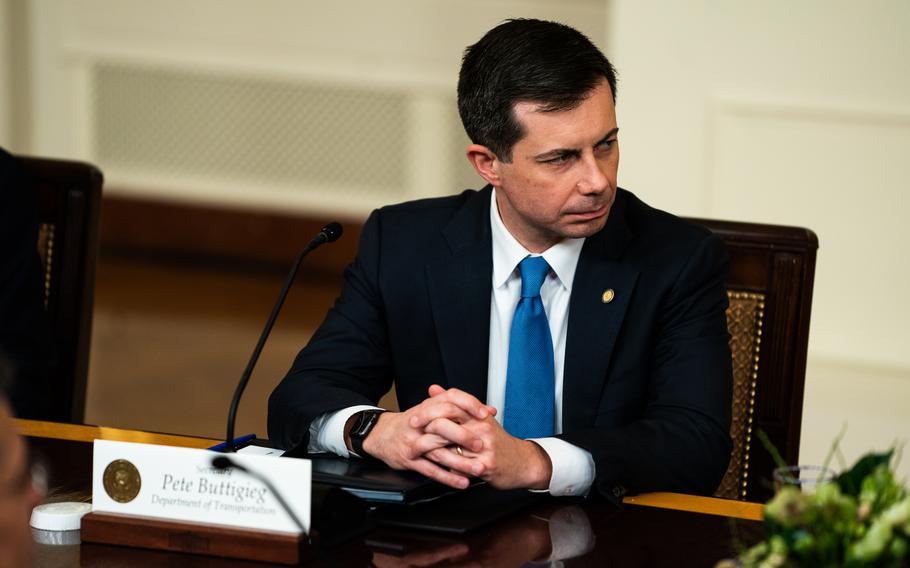
Transportation Secretary Pete Buttigieg attends a meeting of the White House Competition Council on Feb. 1, 2023. (Demetrius Freeman/The Washington Post)
The Biden administration is expected to announce on Wednesday a slate of new rules aimed at bringing more transparency to the cost of air travel and making it easier for customers to get refunds when flights are delayed or canceled.
Under the new rules, airlines and ticket agents will be required to disclose up front fees for checked and carry-on bags and for canceling or changing a reservation. Previously, the Transportation Department only required airlines and ticket agents to initially disclose mandatory carrier-imposed and government charges.
The rules would also streamline the refund process for travelers when they experience significant delays or when their flights are canceled. The new requirements are designed to ensure that consumers receive prompt refunds of fees when their checked bags are significantly delayed.
In a statement, Transportation Secretary Pete Buttigieg said it was estimated that the disclosure requirement could save consumers more than half a billion dollars a year in unexpected fees. On refunds, he said, “Passengers deserve to get their money back when an airline owes them — without headaches or haggling.”
The rules were spurred in part by the record number of complaints that the Biden administration received during the coronavirus pandemic, the vast majority of which involved refunds. Consumers alleged that airlines and ticket agents delayed or refused to provide refunds when millions of passengers stopped flying during the height of the pandemic.
Airlines have generally opposed new regulations and disputed the contention that they aren’t responsive to consumer concerns, arguing that it is in their best interest to provide consumers with a positive experience.
In comments submitted in response to the refund rule, Spirit Airlines wrote last year that while it supported the Transportation Department’s objective that consumers be treated fairly, “continued cooperation and flexibility will better serve the public interest than the proposed one size fits all approach.”
“The Department should consider unintended harm to consumers from this overly board and largely unnecessary rulemaking,” the carrier argued.
Airlines for America, a trade group that represents the nation’s largest carriers, last year urged the Transportation Department to withdraw its fee disclosure rule, arguing that: “Further regulation of ancillary service fees is unnecessary, arbitrary and capricious, and beyond DOT’s statutory authority because there is no market failure to regulate.”
“The internet makes it possible for consumers to access a trove of detailed travel information,” it wrote in comments about the proposed rule. “Consumers do not need the government to decide for them what levels of service airlines should provide any more than they need the government to decide for them how much airlines should charge, or what schedules they should fly.”
Under current rules, travelers are entitled to refunds when a flight is canceled or significantly changed. But refund policies differed between airlines in part because there was no single definition for “significantly changed.” The new rule now specifies that if a flight’s arrival or departure time is changed by more than three hours for domestic flights or six hours for international flights; departs or arrives from a different airport, increases the number of connections; downgrades the passenger to a lower class of service; or involves connections at different airports or a flight on an aircraft that is less accessible or accommodating to a person with a disability, passengers will be entitled to a refund.
The final rule also will require airlines to automatically issue refunds, rather than requiring passengers to explicitly request them in cash or in the purchaser’s original form of payment. Refunds for the full amount paid by the consumer, minus any portion already used, must be issued within seven business days for tickets purchased with a credit card and 20 calendar days for those purchased with other forms of payment.
The Transportation Department also has focused on improving the travel experience for consumers, creating dashboards to help consumers understand their rights when flights are canceled or significantly delayed, including when they are eligible for hotel accommodations or meal vouchers. Another dashboard offers consumers information on which airlines offer fee-free family seating.
Last week, the department announced a partnership with a bipartisan group of 18 state attorneys general aimed at more quickly addressing consumer complaints about airline or ticket agent practices. Under the arrangement, state attorneys general using guidelines provided by the Transportation Department would review the complaints and then forward those that require further action to federal officials.